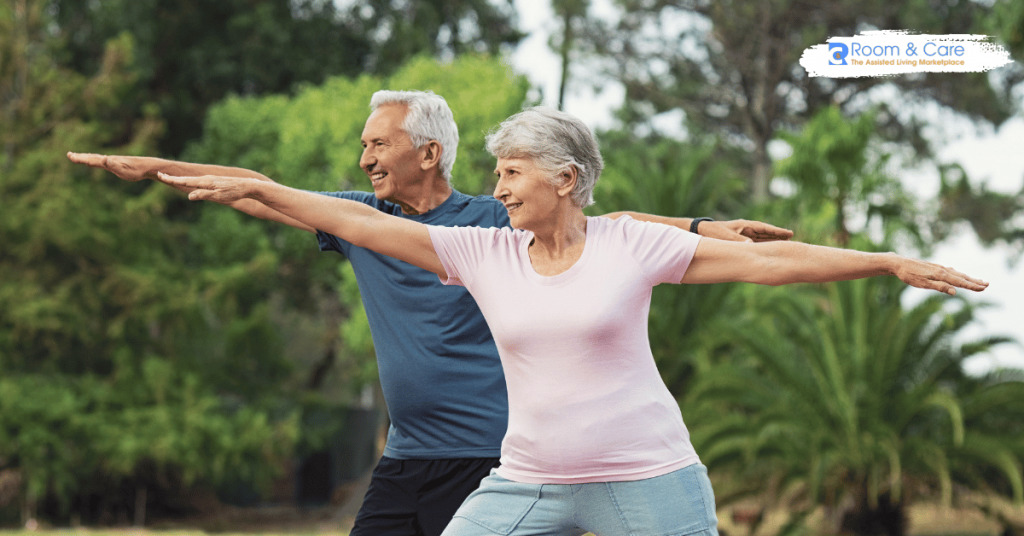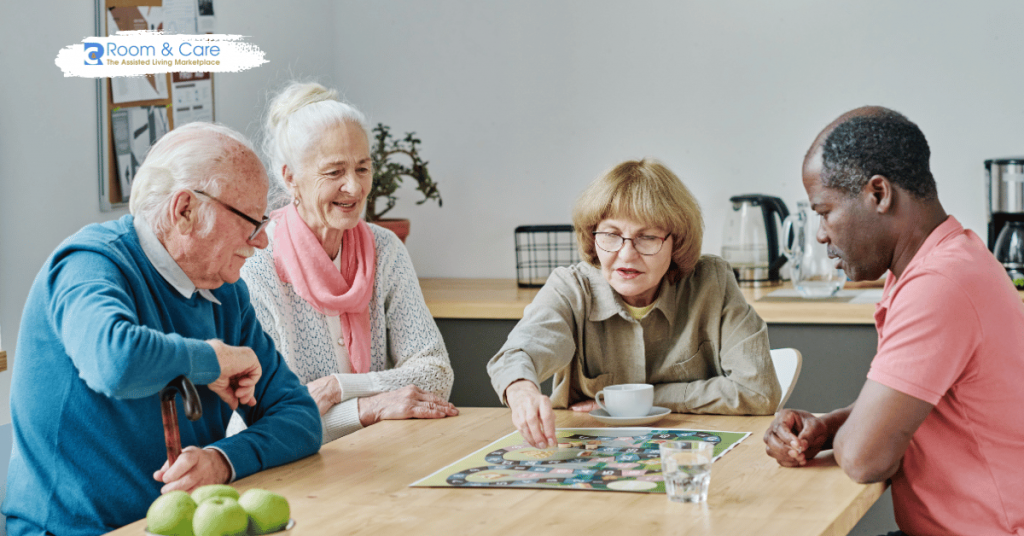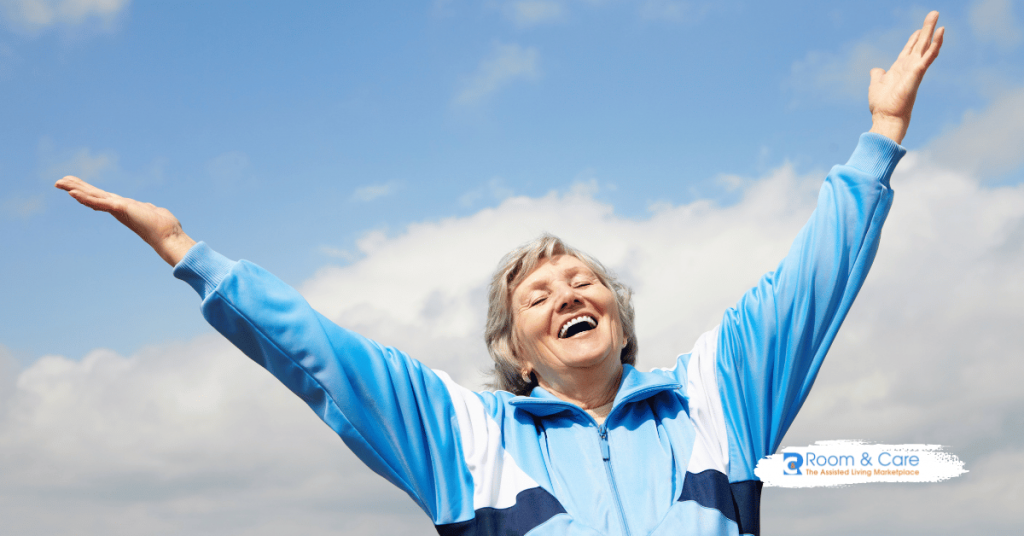

As we age, staying active and engaged becomes increasingly important for our physical, mental, and emotional well-being. Activities for seniors is a crucial aspect of senior living that can significantly enhance the quality of life. Whether living independently or in assisted living facilities, seniors benefit immensely from a variety of activities designed to keep them active, social, and mentally stimulated.
In this comprehensive guide, we will explore the significance of activities for seniors, delve into the benefits, considerations, and decision-making factors, and provide practical advice and tips to help you or your loved ones stay engaged and vibrant. We’ll also introduce you to Room and Care, your go-to resource for finding the best care options without any referral fees or middlemen.
Engaging in physical activities helps seniors maintain mobility, strength, and overall physical health. Regular exercise can reduce the risk of chronic diseases such as heart disease, diabetes, and arthritis, while also improving balance and coordination, which can prevent falls.
Mental stimulation is vital for seniors to maintain cognitive functions and prevent or delay the onset of dementia and Alzheimer’s disease. Activities that challenge the brain, such as puzzles, games, and learning new skills, keep the mind sharp and engaged.
Social interactions and emotional connections are crucial for mental health. Participating in group activities helps seniors combat loneliness and depression, fostering a sense of community and belonging.
Exercise classes tailored for seniors, such as yoga, tai chi, and water aerobics, are excellent for improving flexibility, strength, and cardiovascular health. These classes are often designed to accommodate various fitness levels and physical abilities.
Walking clubs provide a low-impact, enjoyable way for seniors to stay active. These clubs often meet in parks or community centers, offering a social component alongside the physical benefits.
Dancing is a fun and engaging way to stay physically active. Whether it’s ballroom dancing, line dancing, or even Zumba, seniors can enjoy the physical workout and social interaction.

Puzzles, crosswords, Sudoku, and board games are fantastic for keeping the mind sharp. These activities challenge the brain and provide a sense of accomplishment upon completion.
Reading books, magazines, and newspapers keeps seniors informed and mentally stimulated. Writing, whether it’s journaling, creative writing, or letter writing, is also an excellent way to maintain cognitive functions.
Lifelong learning keeps the brain active. Many community centers and online platforms offer classes on a wide range of subjects, from history and literature to computer skills and foreign languages.
Group outings to museums, theaters, and parks provide social interaction and new experiences. These outings can be organized by senior centers or assisted living facilities.
Joining clubs and organizations based on interests, such as gardening, knitting, or book clubs, helps seniors build friendships and stay socially active.
Volunteering offers a sense of purpose and community involvement. Many organizations welcome senior volunteers, providing opportunities to give back and stay connected.
Engaging in arts and crafts projects allows seniors to express their creativity. Painting, knitting, pottery, and other crafts can be both relaxing and fulfilling.
Listening to music, playing instruments, or singing in a choir can be incredibly therapeutic. Music activities are known to enhance mood and cognitive functions.
Cooking and baking not only provide a creative outlet but also promote healthy eating habits. Cooking classes or group cooking sessions can be both educational and social.
Regular physical activity helps seniors maintain muscle mass, flexibility, and balance, reducing the risk of falls and injuries. It also promotes cardiovascular health, contributing to overall well-being.
Engaging in mentally stimulating activities can improve memory, problem-solving skills, and cognitive functions. It helps keep the brain active and may reduce the risk of cognitive decline.
Social activities prevent isolation and loneliness, which are common issues among seniors. Building and maintaining relationships through group activities and clubs is vital for emotional health.
Participating in activities that seniors are passionate about gives them a sense of purpose and fulfillment. Whether it’s volunteering, teaching, or pursuing hobbies, these activities contribute to a positive outlook on life.
Activities that bring joy and satisfaction, such as creative arts or spending time with pets, can significantly improve emotional well-being. They help reduce stress and anxiety, promoting a happier, more contented life.

When selecting activities, it’s essential to consider the senior’s physical abilities and limitations. Activities should be enjoyable and safe, without causing strain or discomfort.
Aligning activities with the senior’s interests and hobbies ensures they remain engaged and motivated. Whether they enjoy gardening, painting, or playing chess, choosing familiar and enjoyable activities enhances participation.
Some seniors thrive in group settings, while others prefer solitary activities. Understanding their social preferences helps in selecting suitable activities that match their comfort level.
It’s important to choose activities that are appropriate for the senior’s cognitive abilities. For those with dementia or cognitive decline, activities should be simple, enjoyable, and non-frustrating.
Consider the availability of resources such as transportation, facilities, and equipment. Ensuring easy access to activities promotes regular participation.
Introduce new activities gradually to prevent overwhelm. Starting small allows seniors to adjust and find what they enjoy without feeling pressured.
Consistency is key to reaping the benefits of activities. Encouraging regular participation helps seniors establish routines and maintain engagement.
Providing support and encouragement can boost confidence and motivation. Whether it’s joining them in activities or simply cheering them on, your support makes a difference.
Be open to adapting and modifying activities to suit the senior’s changing needs and abilities. Flexibility ensures they can continue to participate and enjoy the activities.
Offering a variety of activities prevents boredom and keeps things interesting. Mixing physical, mental, social, and creative activities provides a well-rounded experience.
Involving family and friends in activities enhances the social experience and provides additional support. Shared activities strengthen bonds and create lasting memories.
According to the Centers for Disease Control and Prevention (CDC), regular physical activity can reduce the risk of chronic diseases and improve overall health in older adults. Studies have shown that active seniors are less likely to develop heart disease, diabetes, and obesity.
Research from the Alzheimer’s Association indicates that mental stimulation through activities such as puzzles, reading, and learning new skills can slow cognitive decline. Engaging in mentally challenging activities is associated with a lower risk of dementia.
A study published in the Journal of Health and Social Behavior found that strong social connections are linked to longer life expectancy and better health outcomes. Seniors who maintain social ties are less likely to experience depression and anxiety.

For seniors with limited mobility, activities such as chair yoga, seated exercises, and arts and crafts are ideal. These activities are low-impact and can be done from a seated position.
Encouragement and support are key. Start by introducing activities they enjoy and join them in participation. Highlight the benefits and make the activities fun and engaging.
Yes, activities such as music therapy, sensory stimulation, and simple crafts are suitable for seniors with dementia. These activities are designed to be enjoyable and stress-free.
Seniors should aim to engage in activities daily, with a mix of physical, mental, social, and creative activities. Consistency is important for maintaining health and well-being.
Absolutely. Activities that promote social interaction, mental stimulation, and physical exercise can significantly improve mental health, reducing the risk of depression and anxiety.
Engaging in a variety of activities is essential for seniors to maintain physical health, mental sharpness, and emotional well-being. By choosing activities that align with their interests and abilities, seniors can enjoy a fulfilling and vibrant life. Remember to start small, be supportive, and promote consistency to ensure they stay active and engaged.
At Room and Care, we are dedicated to helping you find the best assisted living facilities, adult family homes, memory care facilities, nursing homes, and independent living communities. We offer these services with no referral fee or middlemen, ensuring direct access to the best care options at reduced costs. Visit our website today to explore the best options for your loved ones and ensure they receive the care and engagement they deserve.
Take the next step towards enriching the lives of seniors by exploring our resources and discovering the perfect activities to keep them healthy, happy, and engaged. Together, we can make a significant difference in their quality of life.